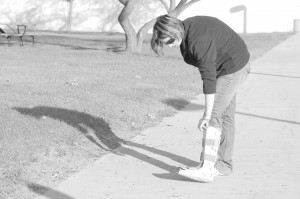Struggling to move around campus

Inaccessible entrances, broken elevators, heavy doors. Aiana Scott, a sophomore at Oakland University, has seen it all.
Scott was diagnosed with cerebral palsy on the right side of her body and as a result, her accessibility was severely altered leaving her with walking equipment and a limp. For her, every day is a struggle.
Recurrent obstacles
The stairs in Varner Hall are not accessible with a wheelchair. The double doors in the bathrooms are too heavy for a disabled student to hold open alone.
These are just some of the issues disabled students face everyday while on campus.
“Depending on where your class is, it could be any type of challenge,” said Scott, president of Student Toward Understanding Disabilities (STUD). “To find a bathroom that you can actually get your wheelchair or scooter through, for the average person it takes five minutes, for a disabled person it can take anywhere from 10 to 20. Taking those things into account, you really have to re-route your life.”
Bathrooms, heavy doors, slippery sidewalks, broken elevators and stairs are just some of the accessibility concerns raised by students each year.
The recent construction on campus also posed as a concern for some students, forcing them to take different, and often more time-consuming, routes to class.
“You can’t look at it the way the average person would look at it … the bridge at Beer Lake, the angle of the bridge is not healthy and it’s suggested you have to take another way around,” Scott said.
Over the years, student organizations like STUD have raised awareness about disabled accessibility on campus. Some of the issues they have brought attention to have been the stairs in Varner Hall, drink dispensers in the student cafeteria — which are difficult to reach when in a chair — lack of an accessible bathroom in the Varner Recital Hall and most recently, the push-button triggers to open a door that is locked in Elliott Hall.
Accessible bathrooms are also a major concern for disabled students.
Wheelchairs or motorized scooters are not accessible in the bathrooms in Varner Hall. The bathrooms in Kresge Library do not follow code.
“If you have to go to the bathroom, what do you do?” said Brian Wigman, a senior and co-founder of STUD. “You either have to climb the stairs or you have to leave Varner Hall and hope that Elliott Hall is unlocked and if it’s not, you have to go to the Oakland Center. And this is all just to go to the bathroom.”
Wigman was diagnosed with cerebral palsy shortly after birth. As a result, Wigman must use a motorized scooter to get around campus.
A resident in the student apartments, Wigman faces a series of challenges every day when leaving or returning to his apartment.
“The doors are very heavy and they’re very difficult and there are no elevators in the student apartments,” Wigman said. “Accessibility is an expensive thing … we try and be as cognitive as possible when it comes to finances, but it still isn’t any less frustrating when you can’t get to class, can’t use the bathroom, can’t wash your hands or can’t visit the recital hall.”
One student’s frustration
Sophomore Erin Sobetski experienced accessibility problems on campus from a different perspective after undergoing a series of surgeries because of a flat foot. Sobetski came to OU two years ago in a cast and on crutches. The day she moved into her dorm, she was in a walking boot.
After undergoing even more surgeries during the year, Sobetski was back in a cast and walking boot. Returning to campus two weeks after surgery, Sobetski was given a motorized scooter to help with her mobility on campus.
“Only one of my classes is on the first floor,” Sobetski said. “In my building, I have to either go up a floor or down a floor to get to my room. At one point, the elevator in my building was broken, so I had to find somebody strong enough to carry me down the stairs so I could go to my room.”
Sobeski had to find friends who would open doors for her, hold her plate in the cafeteria and walk her to class.
“I always made sure I had a friend with me to hold the door open because sometimes, I couldn’t hold it long enough to get my scooter through,” Sobetski said.
Sobetski said that the strain on her mobility made her more aware about accessibility issues on campus.
On-campus assistance
STUD is the only disability student organization on campus and was created to help raise awareness about disabled issues on campus and not all of the members on the executive board have disabilities.
“What STUD does personally, for bringing these challenges to light, is we follow the procedure of Oakland University,” Scott said. “We have to report it to the department of social services and they put an order and then from there it is handled and adjusted.”
STUD hosts a variety of panel discussions each year where they discuss living with a disability and panel questions can be answered. The organization is currently working toward implementing a mentoring program next semester to assist students with disabilities.
“We were able to accomplish a lot of things just like getting people aware of disabilities on campus. People in the community and on campus knew what STUD was … it’s just that kind of awareness and getting the word out,” Wingman said.
STUD is holding their next meeting on Nov. 16 in the Oakland Room of the Oakland Center from noon to 1 p.m.
OU campus not totally handicap-accessible from The Oakland Post on Vimeo.







